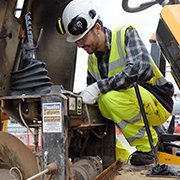Working with the construction industry to deliver cleaner air
Jason Andrews, EH Pollution Manager and Andrew Gordon, Project Manager, London Borough of Merton, detail their work to reduce air pollution caused by the construction industry through a collaborative approach.
The traditional view that construction, by its very nature is an industry that pollutes local air, needs revision. Innovations over the last decade have been profound, with many steps taken toward decarbonisation and the reduction of toxic emissions. Merton’s air quality team have a long history of working with the industry to deliver the best outcomes for air pollution across London.
The team lead the industry in promoting the use of new technologies, introducing power management expertise and encouraging retro-fit. They have for many years produced the London Code of Practice for Construction which guides developers on the ever-changing world of best practice. It serves as a simple easy-to-follow guidance that can be referenced in planning conditions, enabling a succinct planning condition to deep-dive into detailed guidance.
One project we are particularly proud of is the Cleaner Construction for London Project, which in simple terms is an ultra-low emission zone for the construction industry. Over the last decade, this project has been quietly ensuring that construction and demolition is using the cleanest equipment possible. We have seen the project cut toxic emissions from the London construction fleet by nearly a half.
Way back in 2015, as the sources of air pollution were mapped in London, it was clear that the engines used on sites were a considerable source of both PM2.5 and NO2 and on a practical level, had been unregulated for years. There was simply no incentive to ensure that the cleanest kit was being used. With competition in tendering always in the mix, the lack of a consistent set of expectations for emissions in London, meant that well-meaning environmental managers had a tough time promoting their agenda.
Emissions mapping is often modelled around the road-side monitoring networks. However, we also need to understand that some larger sites and regeneration areas sit close to sensitive receptors such as schools and homes. These activities can last for many years, significantly impacting health.
The Mayor of London decided that this was an area that needed to be addressed and offered to work with Local Authorities to introduce into the planning agenda conditions to ensure that sites operate the cleanest non-road mobile machinery (NRMM) as possible at that point in time. The expectations were escalating over forthcoming year.
Merton picked up the challenge and initially operated the scheme throughout South London and since 2019 has been operating the scheme across London on behalf of the GLA and in partnership with boroughs and the industry.
What we’ve achieved is a new approach to delivering a world first, redefining the way industry and boroughs deliver real change.

The programme developed protocols for proactive site inspections that assess the kit on site and ensures that the contractors are using the right equipment, and that sites are hitting the standards specified in their planning documentation. Where findings indicated shortcomings, rather than ‘throwing the book’ and embarking on escalating enforcement, instead guidance was given, and thus a collaborative approach was forged. This on the ground engagement was vital to ensure the policy is delivered as intended, and remains our principal tool for educating sites in innovation and reducing emissions.
This is not a static process but remains one of continuing improvement as we move towards tighter air-quality restrictions and net-zero in London.
The response from the industry has been overwhelmingly positive. The industry has changed, and they care more than ever about their environmental credentials. Rather than an anticipated push-back, contractors welcomed the level playing field established across London.
London can now boast the cleanest construction fleet in the world, with associated carbon savings that are as significant as those of toxic emissions.
The job’s not done, we need to do more. Most equipment in London is now compliant, exposing the most significant issue of off-grid electrical supply, by which we mean, traditionally, diesel generators. With new innovative solutions available, Power Management on sites has become the number one issue. If we want to further reduce the impact of construction onto neighbourhoods, attention to education and cultural change in this area is where we must be focussed.
London has a working proven model that can be adopted in any part of the world and the team are always happy to provide help and guidance. Ask yourself, if a complex city like London can deliver this why can’t you?



.png)



.png)